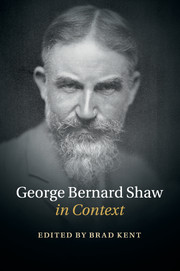Book contents
- Frontmatter
- Dedication
- Contents
- List of illustrations
- Notes on contributors
- Preface
- Acknowledgements
- A Chronology of Shaw's Works
- List of abbreviations
- PART I PEOPLE AND PLACES
- PART II THEATRE
- PART III WRITING AND THE ARTS
- PART IV POLITICS
- PART V CULTURE AND SOCIETY
- PART VI RECEPTION AND AFTERLIFE
- 38 Reception in London, 1892–1950
- 39 Criticism, 1950–2013
- 40 The contemporary North American stage
- 41 Biography
- 42 The Shavian tradition
- Further reading
- Index
- References
42 - The Shavian tradition
from PART VI - RECEPTION AND AFTERLIFE
Published online by Cambridge University Press: 05 October 2015
- Frontmatter
- Dedication
- Contents
- List of illustrations
- Notes on contributors
- Preface
- Acknowledgements
- A Chronology of Shaw's Works
- List of abbreviations
- PART I PEOPLE AND PLACES
- PART II THEATRE
- PART III WRITING AND THE ARTS
- PART IV POLITICS
- PART V CULTURE AND SOCIETY
- PART VI RECEPTION AND AFTERLIFE
- 38 Reception in London, 1892–1950
- 39 Criticism, 1950–2013
- 40 The contemporary North American stage
- 41 Biography
- 42 The Shavian tradition
- Further reading
- Index
- References
Summary
The idea of a Shaw tradition only works if conceived of in large terms: seeing Shaw in a continuum with Ibsen as restoring seriousness to dramatic literature, engaging the issues people confront when they come into conflict with organised society or with their own needs and desires. In that sense, all plays subsequent to Ibsen and Shaw that enact the conflicts between the individual and system belong in a continuum with the founders. But there is no school of Shaw: he has no direct descendants; no playwright has been able to reproduce the exact mixture of nineteenth-century theatrical modes and character types, a musical rhetoric of monologue and dialogue that astonishes the audience through its energy and stylisation, the continual subversion of the audience's assumptions and expectations, the playing with ideas that range from provocative to outlandish, and the capacity to make debate dramatically compelling – all under the umbrella of the structures and habits of classic comedy and an unmatched geniality of humour. Rather, Shaw has produced heirs to the riches of his dramatic model. He writes plays too idiosyncratically to be imitable.
When someone tries to imitate Shaw, as Noel Coward tried to imitate You Never Can Tell with The Young Idea, he fails to become Shaw's adopted child. Shaw reacted by urging – actually by ordering – Coward never to read or see another Shaw play but to become himself. It was Neil Simon who pinpointed the true inheritance Shaw offered to his heirs. In recounting the process of writing his play of mixed success, The Star Spangled Girl, Simon attributed the play's failings to his not having heeded what he had learned about playwriting from Shaw: ‘Make your protagonist and antagonist equal adversaries, so that the audience was always in doubt as to who was right and who was wrong’.
Shaw had enunciated the principle that he adhered to in the Epistle Dedicatory to Man and Superman, where he wrote about his characters’ opinions: ‘They are all right from their several points of view; and their points of view are, for the dramatic moment, mine also’ (CPP II: 517). Shaw goes on to assert that a playwright must not assume that he views life from ‘an absolutely right point of view’.
- Type
- Chapter
- Information
- George Bernard Shaw in Context , pp. 350 - 356Publisher: Cambridge University PressPrint publication year: 2015



